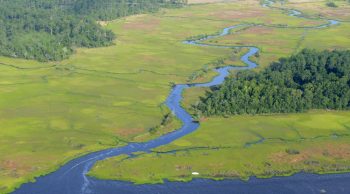Hundreds of people attended the Environmental Protection Agency (EPA) PFAS Community Engagement Event on Tuesday, Aug. 14, in Fayetteville.
PFAS are a group of man-made industrial chemicals – perfluoroalkyl and polyfluoroalkyl substances – that include GenX. Although research on the potential effects of these emerging compounds is limited, scientific evidence associates these compounds with adverse human health and ecological effects. The purpose of this informational meeting was for EPA to hear from the public and address issues that have emerged due to PFAS contamination of the drinking water supplies within the Cape Fear River. It was brought to the public’s attention in 2017 that Chemours, a chemical manufacturing plant, had been contaminating the river with a PFAS compound called GenX for nearly 40 years. Since the story broke, local, state and federal agencies, including the EPA, have been investigating better ways to halt the emissions of and/or filter PFAS and other harmful compounds out of drinking water supplies.

Town Creek, Cape Fear River, August 11, 2014. Overflight provided by SouthWings, photo by Alan Cradick.
This informational and public listening meeting was filled with members from the community who have been affected by GenX contamination, including the North Carolina Coastal Federation’s coastal advocate, Kerri Allen.
Allen represented the federation on the “Community Panel,” which included a joint presentation given by Kemp Burdette, the Cape Fear Riverkeeper with Cape Fear River Watch. Other organizations represented along with Cape Fear River Watch and the federation included Sierra Club, North Carolina Conservation Network and Southern Environmental Law Center. The presentation outlined the history of GenX and contamination within the Lower Cape Fear River basin. Following background information, the group outlined their requests for the EPA, which include providing interim support to states, enforcing corporate response, preventing the use of PFAS in firefighting foam and gear and preventing further contamination. Burdette’s presentation can be found here.
“We were pleased to see so many people turn out for the sessions,” said Allen, “and to have the opportunity to voice their concerns directly to the EPA. This issue has affected the lives of many within the community and we can only hope to move forward and solve this complex problem by working together on local, state and federal levels.”
Burdette’s presentation was part of a three-hour working session followed by a five-hour listening session. During the listening session, community members were encouraged to speak up about what they hope the EPA will do to prevent future PFAS contamination and how they will help clean up the Cape Fear River. The comment period is still open to the public until September 28, 2018 and those who could not attend the meeting are encouraged to share their thoughts with the EPA by commenting online. If you wish to submit a comment, click here. The EPA is expected to release a PFAS management plan later this year.
For more information regarding the public meeting, contact Kerri Allen at kerria@nccoast.org or visit the EPA’s website. Additional information about PFAS, including background, current research and health effects, can be found here.
